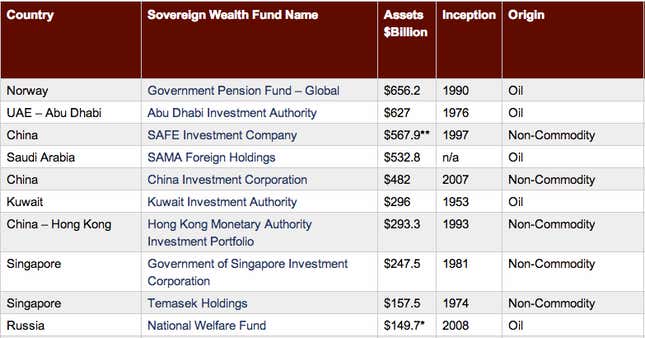
Norway’s sovereign wealth fund has overtaken Abu Dhabi’s as the world’s largest. The rise of the Norway Government Pension Fund—Global (so named, though it’s not actually a pension fund) has not been unexpected; Norway’s oil industry has been booming, and the fund has been able to take advantage of its high exposure to equities markets to catch this year’s rally.
But what is surprising is that Abu Dhabi clearly isn’t keeping pace. Although it does not disclose many of its investments and data, the Abu Dhabi Investment Authority (ADIA) weathered the financial crisis of 2008-2009 remarkably well, reporting 20-year and 30-year returns higher than many of its peers. In 2011, it reported that it had earned an average of 6.9% annually for the previous two decades. Compare that to the 4.48% annual growth of Norway’s fund (paywall) since 1998, and its 633 billion kroner (currently $110 billion) loss after the fall of Lehman Brothers.
Today, both funds appear to run under the same basic guidelines: shifting investments away from slow-growth Europe and looking for yield in emerging markets. About half of Norway’s portfolio is comprised of European assets, versus 25%-35% of ADIA’s, but they’ve both cited attempts to diversify away from that region. Further, both rely on oil profits funneled almost directly into each fund.
So what allowed Norway to overtake Abu Dhabi? First, Norway has been seeing a major boom in oil investment; in September, the country revised its projections for 2012 oil industry growth upwards from 3.2% to 3.6%. Part of that has been generated by an exodus from now-risky euro area assets; non-euro Scandinavian countries have experienced a dramatic influx in capital since the euro crisis began, and investments in Norwegian businesses (like oil) seem more attractive because of Norway’s stability. Norway’s oil profits are put in its sovereign wealth fund, and thus the fund’s capital base is growing faster than ever.
At the same time, Gulf countries have become increasingly concerned that the Arab Spring rebellions will spread from North Africa and the Levant to the east. Thus, they’ve been pouring oil money back into their own economies and those of their neighbors in an attempt to defray income disparities. Middle Eastern countries will put an average of 8% of profits into sovereign wealth funds this year versus 13% in 2011.
